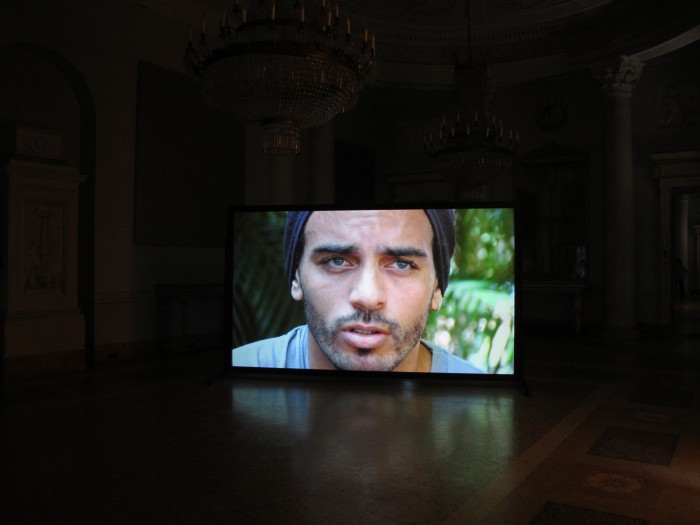Valerio Rocco Orlando – What Education for Mars? – Rome, Havana, Bangalore

In 2011 Valerio Rocco Orlando (Milan, 1978) has conducted a series of workshops in a number of high schools in Rome, Italy. This experience has resulted in a video installation comprising portraits, interviews and conversations amongst students imagining how to build a better school.
This work was shown at the 2012 Havana Biennial and a second production was developed at ISA, the National School of Art in Cuba.
The third instalment of the ongoing project What Education for Mars? will take place this summer at the Valley School, Krishnamurti Foundation India, Bangalore, with the support of the Nomas Foundation, Rome.
During his residency Valerio Rocco Orlando will run a series of workshops and interviews with local high school students, analysing the Indian school system and comparing it with his previous Italian and Cuban experiences. The outcome of this process will be a new video by the Italian artist, focusing on the concepts of awareness, dialogue and exchange, inspired by Krishnamurti’s teachings.
Along with the artist’s project, the curator Maria Rosa Sossai (ALAgroup) will undertake a residency project at the Valley School Study Centre in the course of which she will examine the multifaceted aspects of Krishnamurti’s educational approach in terms of philosophical, political, architectural and psychological concerns, starting from some of his writings dedicated to his educational approach. The analysis of the tuition practiced in Krishnamurti’s schools, together with some interviews to local teachers, will result in an essay in the form of a dialogue with artists, teachers, philosophers, historians of religious matters, etc.
What Education for Mars? is an attempt to experiment with an alternative model of knowledge transmission and relationship within school. As Bruno Latour, in his book “Laboratory Life” (1979) analyses scientific discoveries through the study of the relationships between scientists and their families, What Education for Mars? questions international school systems through the relation among the, as well as their relation to their teachers.
Paraphrasing the statement “Power is not a thing but a relationship” by Michel Foucault, we can intend education not as a sum of notions but as the interaction between two or more subjects with different roles. By defining the outspread of knowledge within the institution of the school as a dialogue among different individuals, what alternative model can we propose?
VALERIO ROCCO ORLANDO – What Education for Mars?
Roma, L’Avana, Bangalore
Nel 2011 Valerio Rocco Orlando (Milano, 1978) ha condotto una serie di workshop in alcuni licei di Roma. Questa esperienza ha avuto come risultato una video installazione che comprendeva ritratti, interviste e conversazioni con studenti con i quali immaginare una scuola migliore.
Il lavoro è stato mostrato nel 2012 alla Biennale dell’Avana e una seconda produzione è stata sviluppata all’ISA, la Scuola Nazionale di Arte di Cuba.
La terza parte del progetto in progress What Education for Mars? si svolgerà questa estate alla Valley School, Krishnamurti Foundation India, Bangalore, con il supporto della Nomas Foundation, Roma.
Durante la residenza Valerio Rocco Orlando condurrà una serie di laboratori e interviste con gli studenti della scuola superiore della Valley School per analizzare il sistema scolastico indiano e compararlo con le esperienze precedenti svolte in Italia e a Cuba. Il risultato di questo processo sarà un nuovo video realizzato dall’artista, focalizzato sui concetti di consapevolezza, dialogo e scambio e ispirato agli insegnamenti di Krishnamurti.
Contemporaneamente al progetto di Orlando, la curatrice Maria Rosa Sossai (ALAgroup) sarà in residenza al Centro Studi della Valley School per studiare i molteplici aspetti del metodo educativo di Krishnamurti in termini filosofici, politici, architettonici e psicologici, attraverso l’analisi dei suoi testi dedicati all’educazione. Il saggio che ne scaturirà comprenderà anche dei dialoghi con gli insegnanti della scuola, artisti, filosofi, storici della religione, ecc.
What Education for Mars? è il tentativo di sperimentare un modello alternativo di trasmissione della conoscenza e di relazione dentro la scuola. Come Bruno Latour che nel suo libro “Laboratory Life” (1979) analizza le scoperte scientifiche attraverso lo studio delle relazioni esistenti tra scienziati e le loro famiglie, What Education for Mars? si interroga sui sistemi scolastici internazionali attraverso le relazioni esistenti tra gli studenti e i docenti.
Parafrasando la dichiarazione di Michel Foucault “Il potere non è una cosa ma una relazione”, l’educazione è da intendersi non come un accumulo di nozioni ma l’interazione tra due o più soggetti che ricoprono ruoli diversi. Se definiamo lo sviluppo della conoscenza all’interno dell’istituzione scolastica come un dialogo fra diversi individui, quale modello alternativo saremo capaci di proporre?